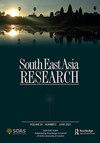‘The buffalo skin written word’: the cultural politics of orality and writing in mainland South East Asia
IF 0.9
3区 社会学
0 ASIAN STUDIES
引用次数: 0
Abstract
ABSTRACT Throughout mainland South East Asia, there are numerous indigenous histories of the loss and return of the written word. These histories are often linked to narratives of Christian conversion, and the desire for literacy and modernity. In this article, I revisit questions about the cultural politics of orality and the written word from the perspectives of certain Akha communities in the Thai–Myanmar borderlands that are relative newcomers to both Christianity and the desire for literacy. I discuss three different histories of the loss and return of the written word as found among Akha Old Traditionalists, Neo-Traditionalists and Baptist Christians in the region. I highlight the ways in which these histories speak to Akha Neo-Traditionalists’ and Baptist Christians’ competing efforts to reimagine the boundaries of Akhaness in a modern, authentic and religious fashion. I conclude by noting how these particular Akha cases contribute to a resurgence of scholarship on the region and its peoples inspired by James Scott’s reframing of the region as ‘Zomia’. I especially narrow in on the fruitful debate inspired by Scott’s most controversial claim that so-called Zomians intentionally discarded their prior writing systems and adopted orality as a means of evading the state.“牛皮文字”:东南亚大陆口头与文字的文化政治
在整个东南亚大陆,有许多关于文字丧失和回归的土著历史。这些历史通常与基督教皈依的叙述,以及对识字和现代化的渴望联系在一起。在这篇文章中,我从泰缅边境的某些阿卡社区的角度,重新审视口头和书面文字的文化政治问题,这些社区对基督教和识字的渴望都是相对陌生的。我讨论了在该地区的阿卡旧传统主义者,新传统主义者和浸信会基督徒中发现的书面文字的失落和回归的三种不同的历史。我强调了这些历史对阿卡新传统主义者和浸信会基督徒以现代、真实和宗教的方式重新想象阿卡内斯边界的竞争努力的方式。最后,我要指出这些特殊的阿卡案例是如何在詹姆斯·斯科特将该地区重新定义为“Zomia”的启发下,为该地区及其人民的学术复兴做出贡献的。我特别将注意力集中在Scott最具争议的观点所激发的富有成效的辩论上,即所谓的Zomians故意放弃他们先前的书写系统,并采用口头表达作为逃避国家的手段。
本文章由计算机程序翻译,如有差异,请以英文原文为准。
求助全文
约1分钟内获得全文
求助全文
来源期刊

South East Asia Research
ASIAN STUDIES-
CiteScore
1.90
自引率
0.00%
发文量
42
期刊介绍:
Published three times per year by IP Publishing on behalf of SOAS (increasing to quarterly in 2010), South East Asia Research includes papers on all aspects of South East Asia within the disciplines of archaeology, art history, economics, geography, history, language and literature, law, music, political science, social anthropology and religious studies. Papers are based on original research or field work.
 求助内容:
求助内容: 应助结果提醒方式:
应助结果提醒方式:


